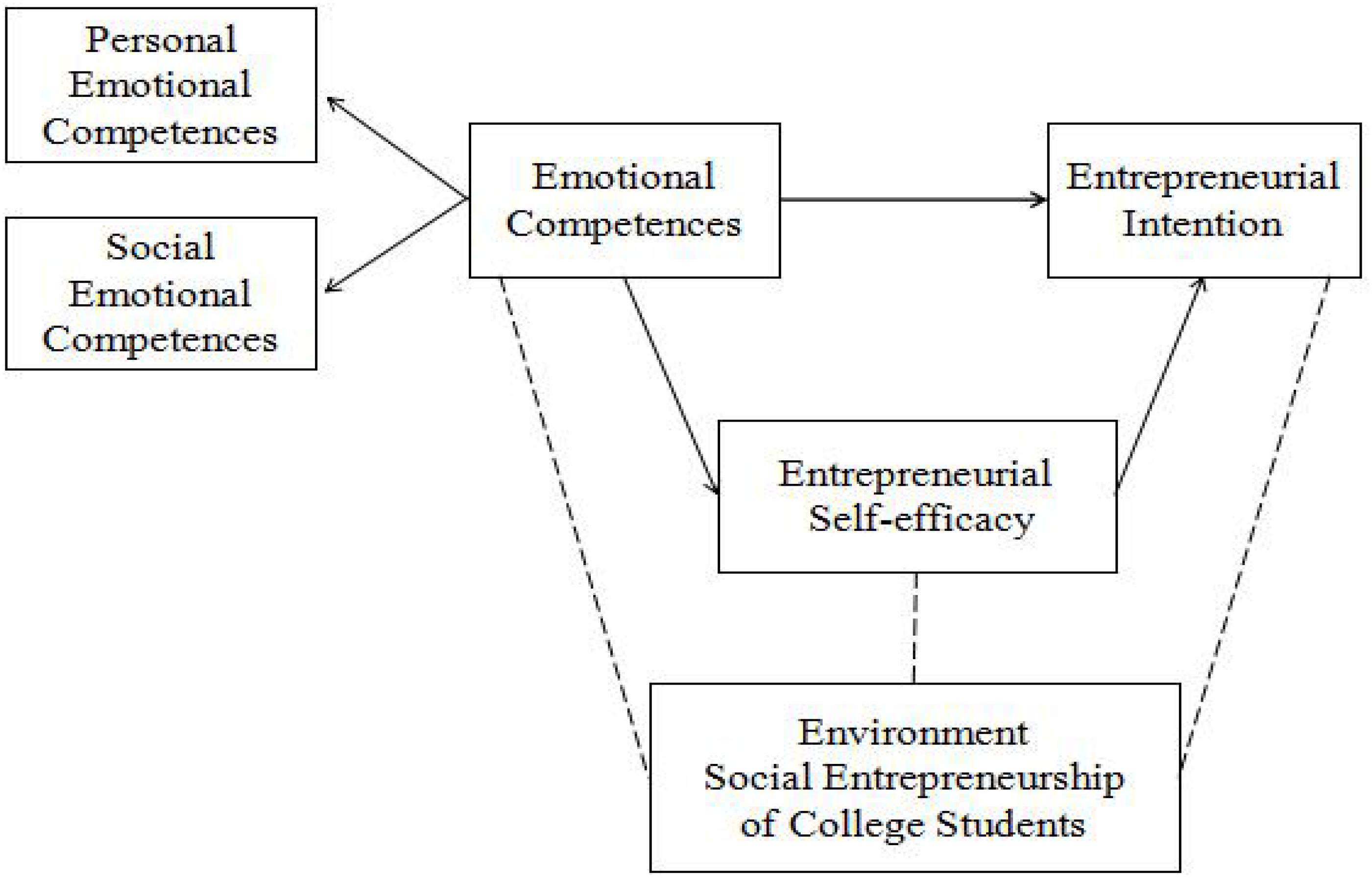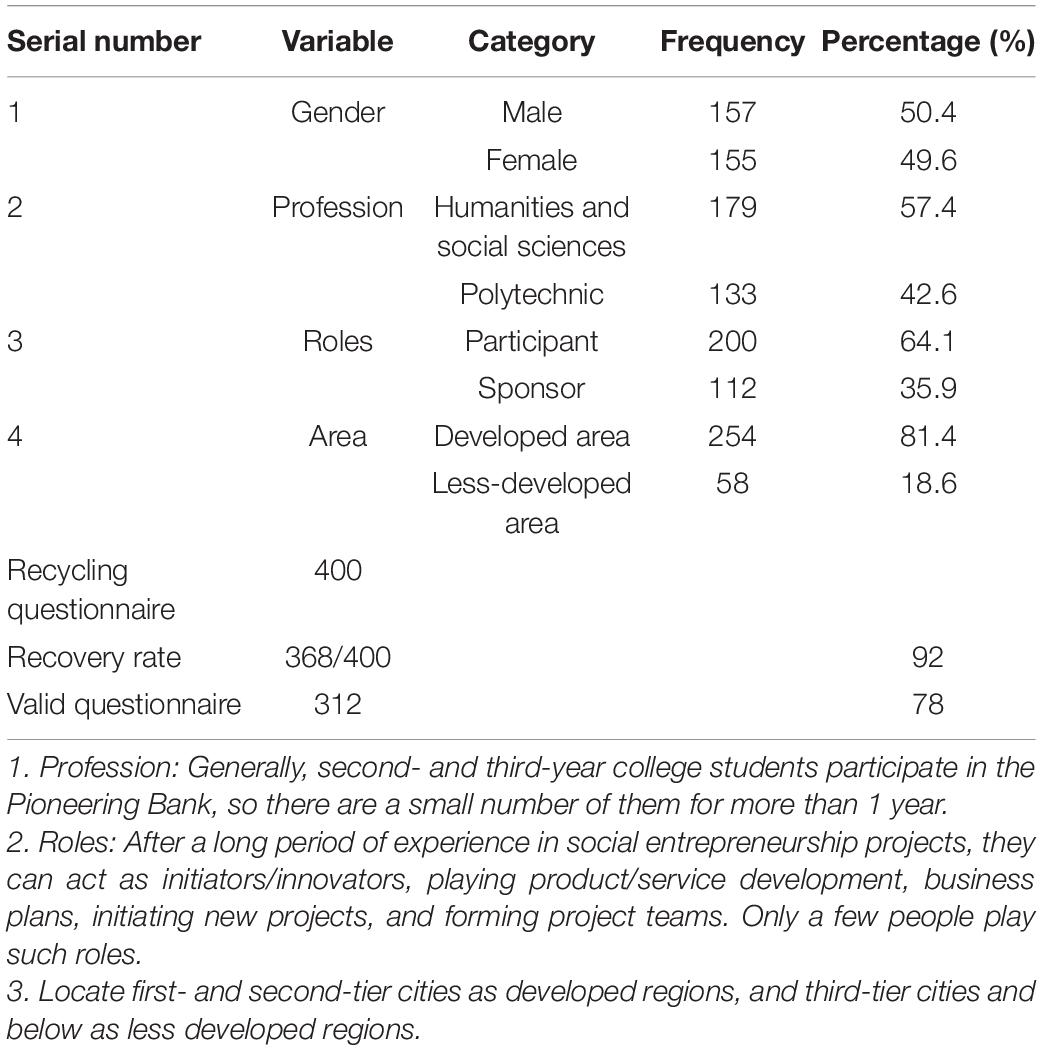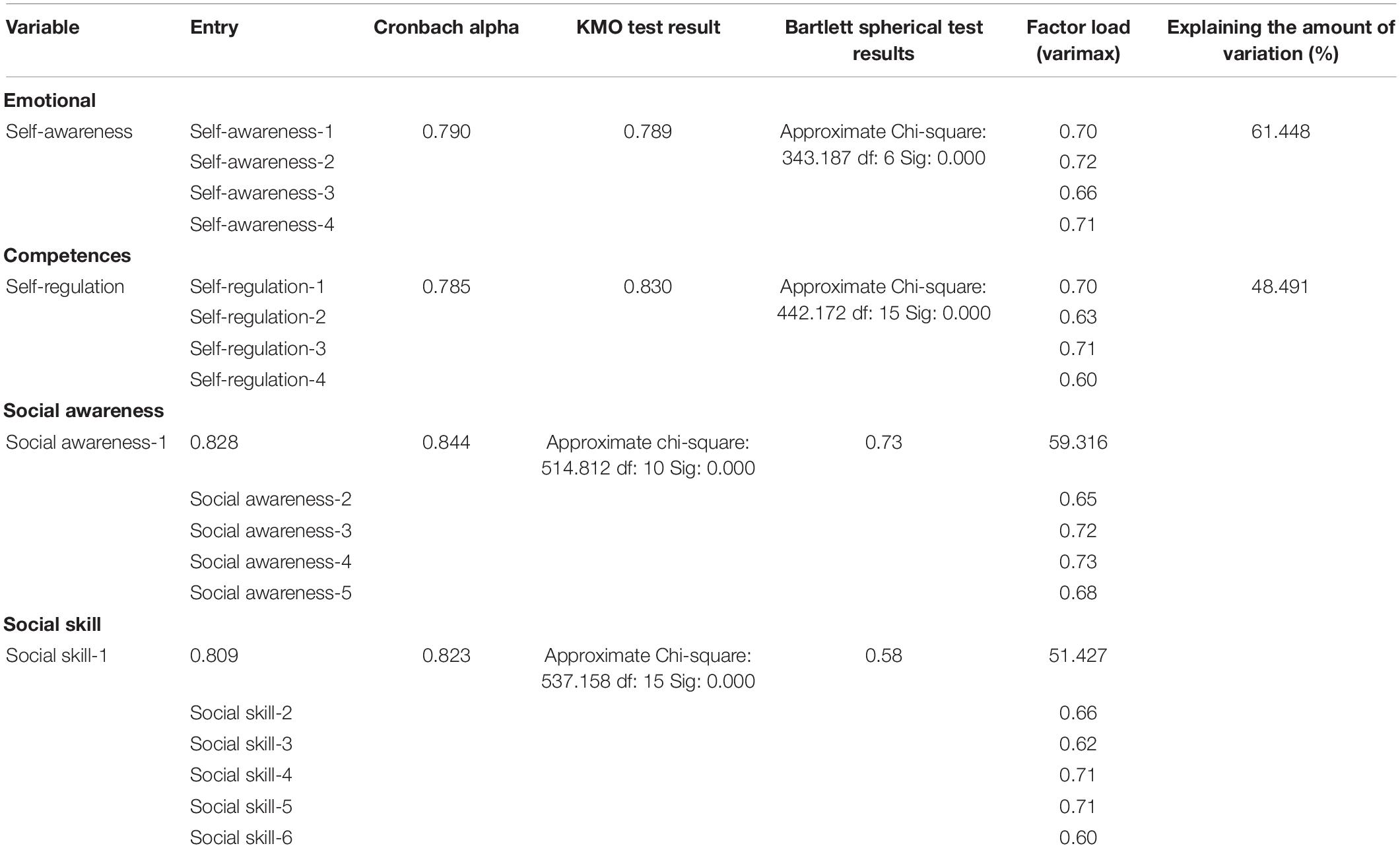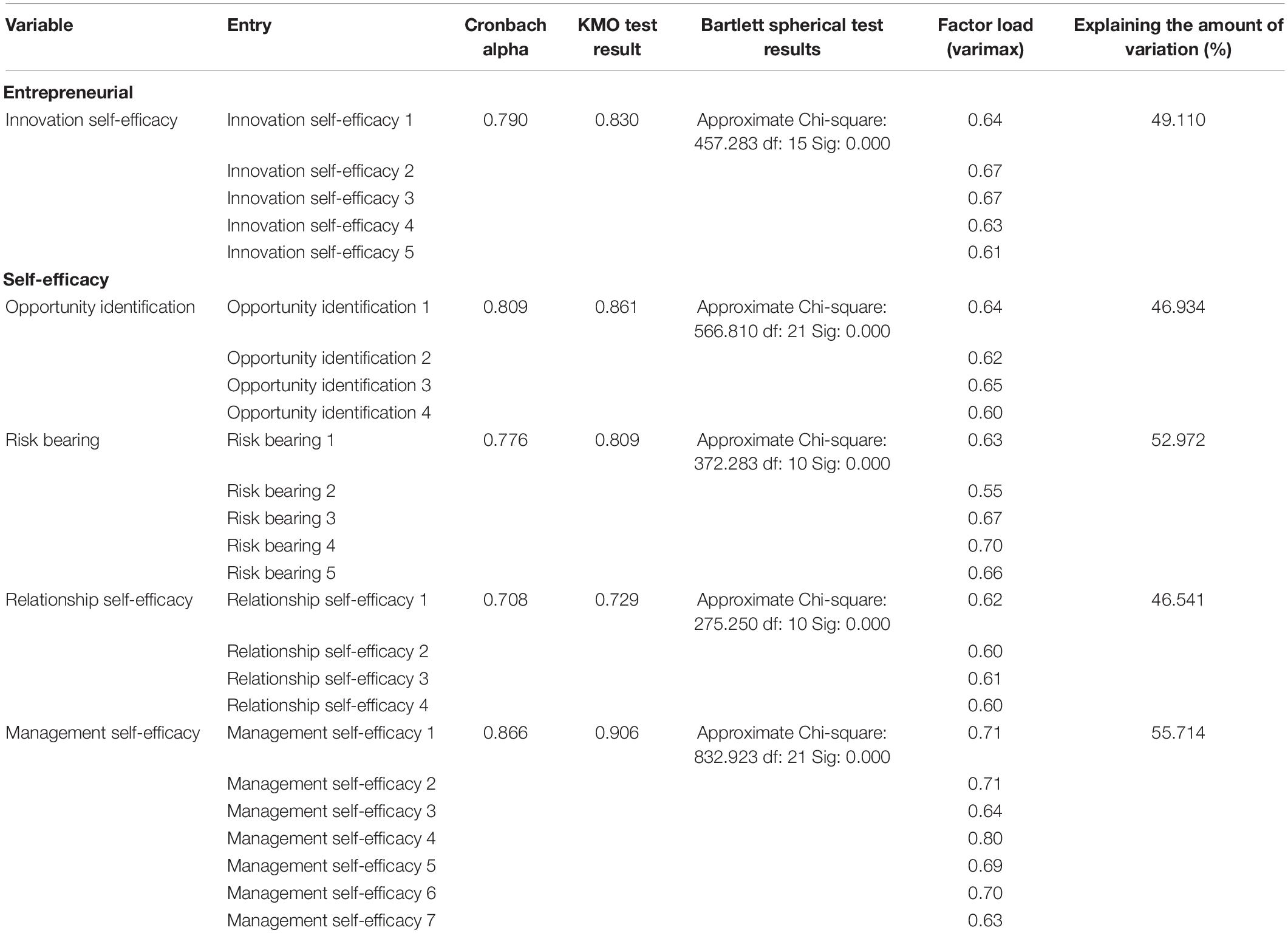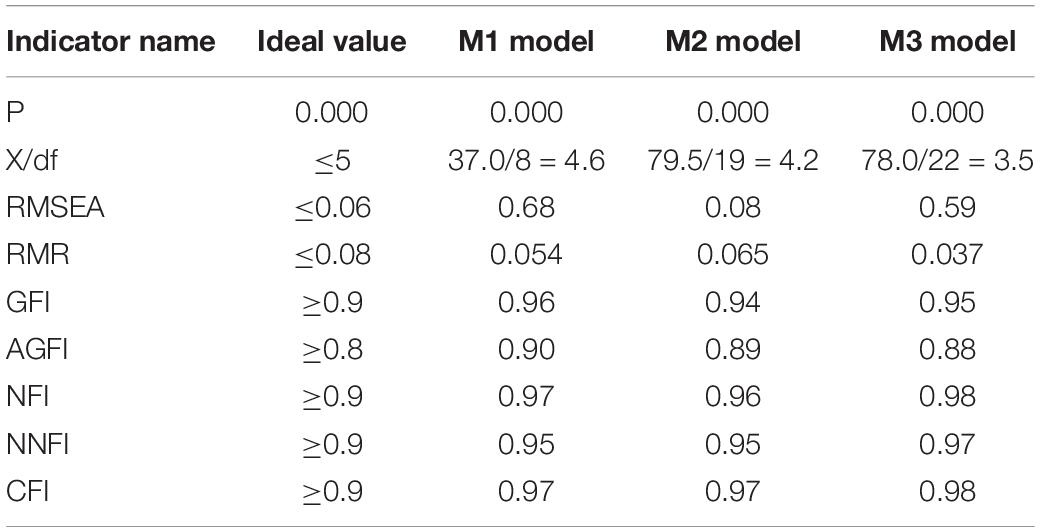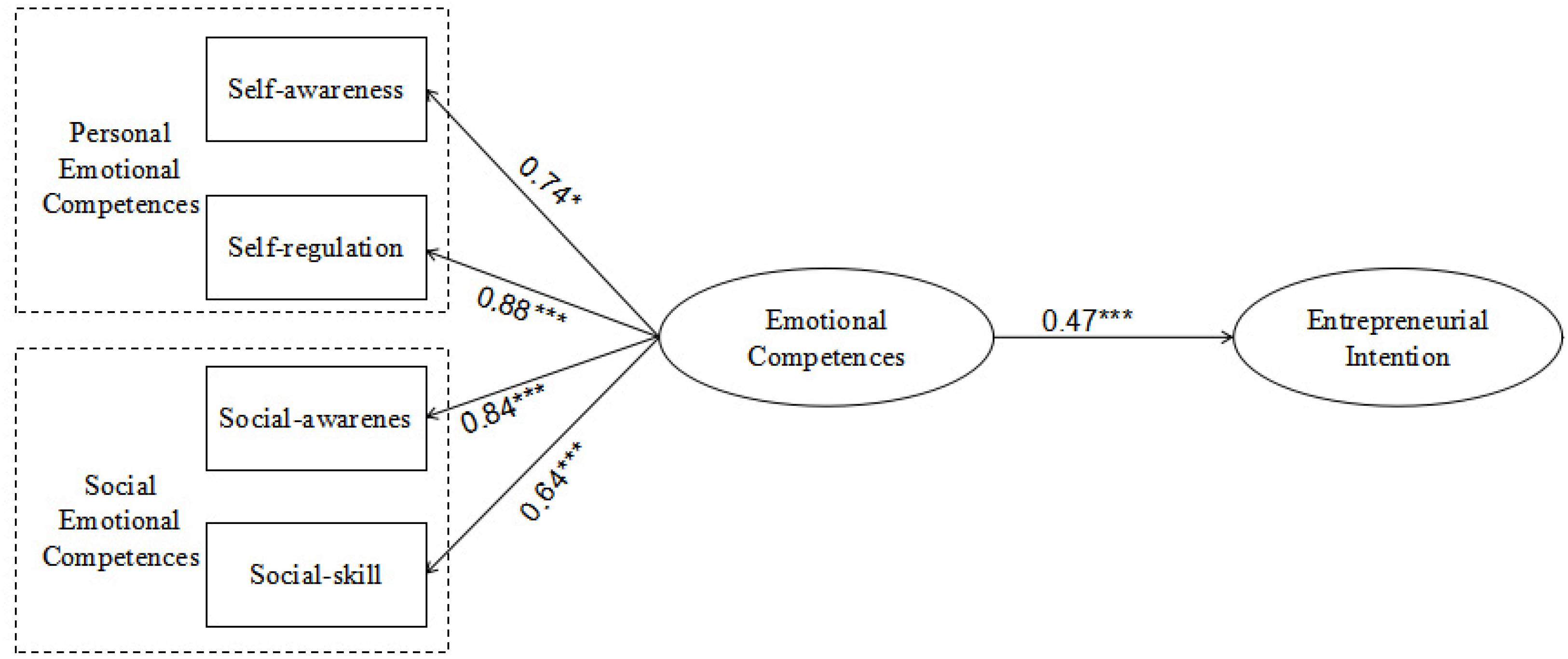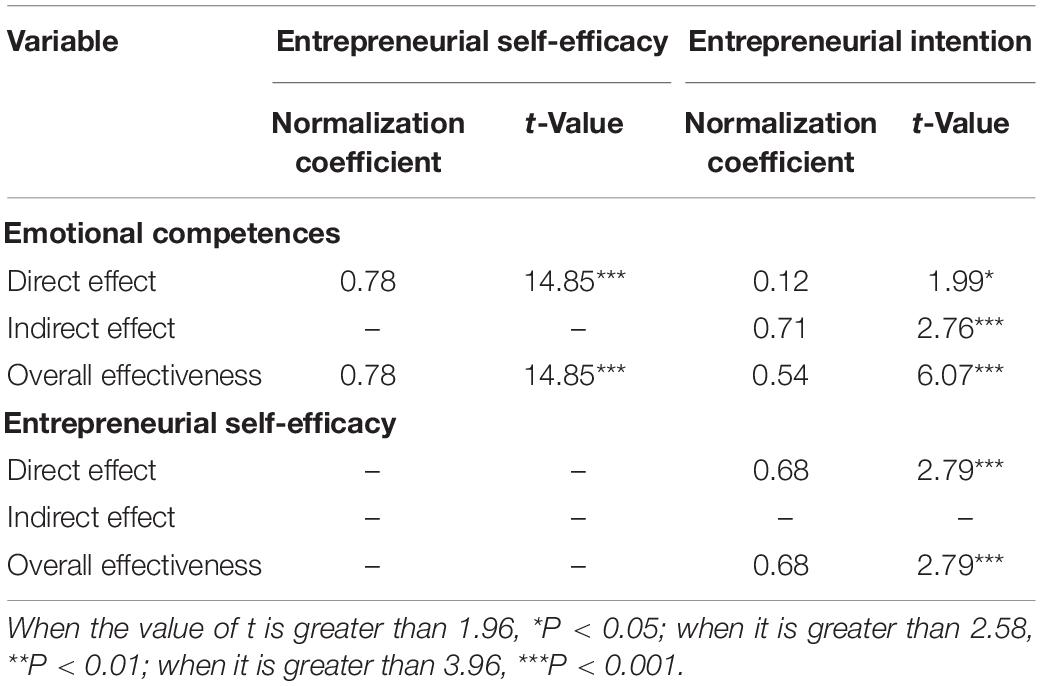- 1Business School, Foshan University, Foshan, China
- 2Business School, Shantou University, Shantou, China
Entrepreneurship education has a lot of research on influencing factors of entrepreneurial intention but rarely studies the influence mechanism of emotional competences on entrepreneurial intention from the perspective of social entrepreneurship. This article takes college students’ social entrepreneurs as research objects, drawing on Krueger’s model, theory of planned behavior, social cognitive theory, and triadic reciprocal determinism theory. This paper constructs a conceptual model with emotional ability, entrepreneurial self-efficacy, and entrepreneurial intention, to further study their relationship. The 312 students from China College Students’ Social Entrepreneurship Project engaged in early entrepreneurship practice, conducted a questionnaire survey and used the empirical test of the structural equation model to analyze the relationship between college students’ emotional competences, entrepreneurial self-efficacy, and entrepreneurial intention. The result show: First, social–emotional competence had a positive effect on entrepreneurial intention, and the positive effect of personal affective competence on entrepreneurial intention was not supported or only partially supported. Second, all the dimensions of entrepreneurial self-efficacy were significantly and positively correlated with entrepreneurial intention. Third, emotional competence has a significant positive impact on entrepreneurial self-efficacy. Fourth, entrepreneurial self-efficacy mediated the relationship between emotional competence and entrepreneurial intention.
Introduction
College students have the potential for innovation and entrepreneurship. Education projects and special policies increasingly provide good infrastructure, capital, and technology support to college students to promote social entrepreneurship. While the overall entrepreneurship awareness of college students is relatively low, the proportion of the class of 2018 college graduates after 6 months of self-employment was only 2.7% (Mycos Institute, 2019). At the same time, they lack a certain degree of management, anti-risk, and competences to adapt to the environment, entrepreneurial perseverance, and hard work. The failure rate among entrepreneurs is as high as 90%. Within 3 years, more than half of all college entrepreneurs will withdraw from the entrepreneurial market. The quality of entrepreneurship education in colleges and universities in China needs to be improved. However, first, the contributions of the presupport provided by colleges and policies should be acknowledged. Next, further reviews of the purpose of entrepreneurship education should be undertaken. Also, we should emphasize greatly on the study of those entrepreneurs’ psychological cognitive mechanism and their motivation.
With regard to entrepreneurship education in college, entrepreneurial intention is the strongest predictor of entrepreneurial behavior. Therefore, identifying the factors that predict entrepreneurial intention has great practical significance. The following factors have been found to influence entrepreneurial intention: decision-making mechanisms (Feola et al., 2017), entrepreneurial differences (Fini and Toschi, 2016; Roy and Das, 2019), entrepreneurship education (Xu et al., 2016; Nowiński et al., 2017; Teixeira and Forte, 2017; Wu et al., 2018), an entrepreneurial background, and environmental factors (Altinay et al., 2012; Palmer et al., 2019). The cognitive approach to entrepreneurship posits that the subjective characteristics of entrepreneurs (e.g., cognitive characteristics) influence entrepreneurial intention (Kirzner, 1978, 1997). Therefore, several scholars have examined the influence of subjective psychological factors, such as the personality traits of entrepreneurs, on entrepreneurial intention (Popescu et al., 2016; Fellnhofer, 2018; Hu et al., 2018). However, a few studies have focused on the effect of emotional competence on entrepreneurial intention, especially from the perspective of social entrepreneurship. Even fewer studies have explored the role of entrepreneurial self-efficacy in the effect of emotional competence on entrepreneurial intention. Exploring the mechanisms that underlie the effect of emotional competence on entrepreneurial intention will contribute to increased entrepreneurial awareness among college students. Emotional intelligence has been defined as the competence needed to recognize and manage one’s own and others’ feelings. Emotional competence encompasses the skills needed to feel, understand, and effectively capitalize on the power of emotions as a source of energy, information, confidence, and creativity as well as the skills needed to influence others (Goleman, 1995, 1998). Indeed, college students are more inclined to pursue self-employment than individuals who have not received college education. Liu et al. (2019), Cui and Sun (2019), Wang (2018), and Xu and Hao (2019) have found that entrepreneurship education has a significant positive effect on entrepreneurial intention among college students. Therefore, research findings that delineate the relationship between emotional competence, entrepreneurial self-efficacy, and entrepreneurial intention among college students may inform college entrepreneurship education and related training programs. Accordingly, this study aimed to determine whether (a) participation in entrepreneurship training provided by China College Students’ Social Entrepreneurship improves the emotional competence of social entrepreneurs, (b) an improvement in emotional competence influences their entrepreneurial self-efficacy, and (c) the formation of entrepreneurial intention in college students is contingent on improvements in emotional competence and entrepreneurial self-efficacy. Further, this study also sought to examine the role of entrepreneurial self-efficacy in the effect of emotional competence on entrepreneurial intention.
This study was designed based on the theory of planned behavior (TPB) and social cognitive theory (SCT). According to Ajzen’s (1988,1991) TPB, entrepreneurial intention is influenced by attitudes, perceived behavioral control, and subjective norms. The TPB posits that the most important factor that influences behavior is intention. Behavioral intention is a necessary contributor to behavioral performance and a prerequisite for behavior (Ding and Liu, 2009). The application and practice of SCT within the domain of entrepreneurship research have revealed that entrepreneurial intention and success are largely influenced by entrepreneurial self-efficacy (Butter, 2001). The potency of entrepreneurial self-efficacy is influenced by subjective and non-subjective abilities such as entrepreneurial task difficulty, effort, and the amount of foreign aid with the environmental conditions of the tasks. The better the emotional competence of an individual is, the greater his or her awareness of entrepreneurial behavior and self-efficacy will be. Subjective competencies influence the strength of entrepreneurial self-efficacy, which is the strongest predictor of entrepreneurial intention. The basic intention-based progress model proposed by Krueger and Brazeal (1994), Yuan and Wu (2020), and Wu et al. (2020) posits that the emergence of the entrepreneurial intention process is very sensitive to initial conditions. Individuals who adopt certain behavioral goals are influenced by external factors and planned behavior attitudes. External factors include skills, knowledge, personality characteristics, and the availability of resources. Planned behavior attitudes refer to the degree of certainty of engaging in a specific behavior. Bandura and Cervone (1986) proposed the triadic reciprocal determinism theory (TRD), which posits that human behaviors are shaped by ternary interactions, are interconnected, and influence each other. Based on Krueger’s model, the TPB, SCT, and TRD, a conceptual model (Figure 1), which includes emotional competence, entrepreneurial self-efficacy, and entrepreneurial intention, was developed. The objective was to examine the relationship between these variables, offer a new perspective and basis for research on innovation and entrepreneurship in China and other countries, and provide suggestions for the long-term development of entrepreneurship education. This article is structured as follows: the section “Research Hypotheses” delineates the hypothesized relationships between emotional competence, entrepreneurial intention, and entrepreneurial self-efficacy; the section “Materials and Methods” describes the data collection procedure, the participants and sampling technique, measures used to assess the study variables, and analytic procedure; the section “Data Analysis and Results” presents the results of the analyses conducted to examine the relationship between emotional competence, entrepreneurial intention, and entrepreneurial self-efficacy; and finally, the section “Conclusion and Relevant Recommendations” are presented.
Research Hypotheses
Emotional Competence and Entrepreneurial Intention
Individuals with high emotional competence are better equipped to undertake entrepreneurial activities. They tend to be more creative and innovative and possess better emotional control skills. In an important situation, the interpersonal relationship will not be damaged by the emotional problems of oneself or others, which are the key factors for starting a starting a business (O’Boyle et al., 2011). Furthermore, individuals with high emotional competence demonstrate better stress tolerance, are more likely to persevere, and seek challenges. Because individuals with better emotional skills are less risk averse, they hold more positive entrepreneurial attitudes. In accordance with the TPB, Chen et al. (2018) and Yuan et al. (2019) have contended that the key to innovation and entrepreneurship education is to influence behavioral intentions related to innovation and entrepreneurship among students. Mikolajczak et al. (2007) have noted that, through self-assessments of emotional efficacy, employees can practice emotional efficacy management and improve their self-cognition competencies. This will enable them to experience greater emotional self-efficacy, take initiatives, and be creative; these changes are conducive to the formation of entrepreneurial intentions. Many studies have found that emotional competence is positively correlated with entrepreneurial intention within the domains of corporate, social, and campus entrepreneurship activities. Leutner et al. (2014) showed that differences in personality characteristics with abilities affect emotional abilities, core self-assessment, entrepreneurial trends, and attitudes are important promoters of entrepreneurial behavior. Zampetakis and Moustakis (2006) found that those with better emotional abilities are more likely to have entrepreneurial intentions. Padilla-Melendez et al. (2014) conducted a comparative analysis and found that the emotional competence of college students who participated in a training program had a significant positive effect on their entrepreneurial intentions. Bonesso et al. (2018) analyzed the emotional competences directly and the mediation effect of entrepreneurial intention, and it is concluded that higher levels of emotional competences can predict entrepreneurial intention. Further, emotional competence is reflected in personal (how individuals handle themselves) and social abilities (how individuals handle others) (Kierstead, 1999). Therefore, the following hypotheses were formulated:
Hypothesis 1: Emotional competence will have a positive effect on entrepreneurial intention among college students.
Hypothesis 1a: Personal affective competence will have a positive effect on entrepreneurial intention among college students.
Hypothesis 1b: Social–emotional competence will have a positive effect on entrepreneurial intention among college students.
Entrepreneurial Self-Efficacy and Intention
Self-efficacy refers to one’s cognitive assessment of his or her ability to mobilize the motivation, cognitive resources, and action processes needed to control events (Wood and Bandura, 1989). According to SCT, individuals with high levels of self-efficacy demonstrate greater courage in uncertain dynamic environments. Therefore, they are more likely to be successful in achieving their personal goals. Entrepreneurial self-efficacy is a belief in entrepreneurial competences directed at itself. Thus, the higher one’s level of entrepreneurial self-efficacy is, the stronger his or her entrepreneurial intentions will be. Ding and Ding (2011) found that entrepreneurial self-efficacy has a strong predictive effect on entrepreneurial intention and the likelihood of occurrence of entrepreneurial behavior. Saulo et al. (2007) identified the following four dimensions of entrepreneurial self-efficacy: opportunity identification self-efficacy, innovation effectiveness, relationship management effectiveness, and tolerance effectiveness. Further, they found that there was a positive relationship between entrepreneurial self-efficiency and intention. Using the General Self-Efficacy Scale and Williams Creativity Tendency Scale, Tu and Wang (2017) found that there was a significant positive relationship between general self-efficacy and entrepreneurial intention among college students. Liu et al. (2018) conducted a study among college students. In accordance with SCT, entrepreneurial self-efficacy significantly and positively influenced participant ability to utilize opportunities and translate entrepreneurial intentions into behaviors. Many studies have used data from different countries and regions to examine the relationship between entrepreneurial self-efficacy and intention. Their results have consistently shown that entrepreneurial self-efficacy facilitates the formation of entrepreneurial intention (Salami, 2019). Therefore, the following hypothesis was formulated:
Hypothesis 2: Self-efficacy will have a significant positive effect on entrepreneurial intention among college students.
Emotional Competence, Entrepreneurial Self-Efficacy, and Entrepreneurial Intention
Does emotional competence influence entrepreneurial self-efficacy and intention? According to past findings, emotional competence plays an important role in entrepreneurial intention. Individuals with high levels of self-efficacy demonstrate better stress tolerance. When problems arise, they are more likely to persevere. This nurtures their willingness to start a business (Panagiotis and Dimo, 2015). Martínez-González et al. (2019) found that subjective factors (beliefs, social norms, and values) initiate a chain of events, which influence action variables (motivation, self-efficacy, and intention). Emotional competence is also a subjective variable. Salvador (2008) examined the positive effects of emotional competence on entrepreneurial self-efficacy. Zhao et al. (2005) found that entrepreneurial self-efficacy influences the formation of entrepreneurial intention by playing an intermediary role in the relationship between personal characteristics and entrepreneurial intention. Tang and Zhang (2018) examined the direct effect of creative personality traits on entrepreneurial self-efficacy and willingness and the mediating role of entrepreneurial self-efficacy in the relationship between creative personality traits and entrepreneurial willingness. Mwiya et al. (2018) also examined the mediating role of entrepreneurial self-efficacy in the effect of different factors on entrepreneurial intention. Fernández-Pérez et al. (2019) found that entrepreneurship is facilitated by the development of emotional competence in university students. In sum, emotional abilities have a positive effect on entrepreneurial intention through entrepreneurial self-efficacy. Individuals with better emotional abilities also have better social abilities. This enables them to build and maintain relationships with potential investors (i.e., for entrepreneurship), and this promotes the formation of entrepreneurial intention. Individuals with high emotional competence are less risk averse. Therefore, they have more positive entrepreneurial attitudes, higher levels of entrepreneurial self-efficacy, and stronger entrepreneurial intentions. Therefore, the following hypotheses were formulated:
Hypothesis 3: Emotional competence will have a significant and positive effect on entrepreneurial self-efficacy among college students.
Hypothesis 4: Entrepreneurial self-efficacy will mediate the effect of emotional competence on entrepreneurial intention.
Materials and Methods
Sample and Questionnaire
This study used questionnaire survey method to collect data from the innovation team of universities in 19 cities in China, selected social entrepreneurship practitioners (university students) in Chinese university innovation organizations as the research objects. College Students’ Social Entrepreneurship is an international nonprofit organization that aims to promote social entrepreneurship and entrepreneurship development among college students, improve their entrepreneurial capacity, and create entrepreneurial awareness. China College Students’ Social Entrepreneurship program currently has 242 college member alliances from most parts of China, including Hong Kong. There are more than 12,000 active members. Such social entrepreneurship activities for undergraduate students promote the formation of entrepreneurial intentions and have a significant social impact. First, College Students’ Social Entrepreneurship is one of the most influential social entrepreneurship organizations. It promotes entrepreneurial practice and provides sustainability training to students. It most closely resembles real-world entrepreneurial organizations. Therefore, entrepreneurial mechanisms can be adequately examined among its members. Second, social entrepreneurship among college students is an independent development project and is not intended for general commercial entrepreneurship purposes. The formation of such entrepreneurial intentions is more universal, and scholars and educators can use relevant research findings to improve entrepreneurial education. The findings can also be used to enhance the diversity of practice methods. Third, this study was designed based on a research project undertaken by the Humanities and Social Sciences Department of Shantou University and conducted with the support of China College Students’ Social Entrepreneurship. Survey resources were provided, and the sample was heterogeneous. Therefore, the data derived from this pioneering project may better reflect the effect of emotional competence and entrepreneurial self-efficacy on entrepreneurial intention.
The questionnaire and measurement items were designed based on past findings and the characteristics of College Students’ Social Entrepreneurship. Second, the opinions of school teachers and class students were solicited. The Shantou University team test was conducted among 20 students. Based on their feedback, the questionnaire was refined. The revised questionnaire was distributed to a large number of students. Subjective variables were assessed using closed-ended items, which were rated on a five-point Likert scale. To avoid response biases, we ensured that the questionnaire did not reveal which variables were being assessed. Further, positively and negatively worded items were included. Moreover, relevant questions were included in the basic situation column to detect response bias. The survey was conducted during a national competition organized by China College Students’ Social Entrepreneurship. Team members from different universities in China responded to the questionnaire, and the samples have good timeliness and diversity. As in Table 1, the questionnaire was implemented by issuing with recycling on-site paper questionnaires. Of the 400 questionnaires that were distributed, 368 were returned, but only 312 were valid. Thus, the response rate was 92%, and the effective response rate was 78%.
Measures
The questionnaire used in this study was developed for use with individuals (i.e., sample units). The questionnaire consisted of three sections: demographic and other characteristics, overall improvement in the respondent with regard to the project (including the four dimensions of emotional competence and five dimensions of entrepreneurial self-efficacy), and entrepreneurial intention. The body of the questionnaire consisted of items that had to be rated on a five-point Likert scale. Participants were required to provide objective ratings for each question.
Response Variable
Entrepreneurial intention was assessed from the perspective of the possibility of individual entrepreneurship. The items that assessed entrepreneurial intention were developed based on Krueger’ s (2000) assessment. As shown in Table 2, the factor loading of each entrepreneurial intention item was greater than 0.55. This indicates that the measurement properties of the questionnaire were acceptable. The Kaiser–Meyer–Olki statistic was 0.829, and Bartlett’s test yielded a significant value (P < 0.001). The cumulative variance contribution of the factors was 56.231%. These findings indicated that factor analysis could be conducted. The Cronbach’s alpha of the assessment was greater than 0.7. This indicated that the scale had adequate internal consistency.
Explanatory Variables
Based on the definition of emotional competence proposed by Mayer et al. (1999), emotional competence was defined as the skills needed to perceive, recognize, manage, and use one’s own or others’ emotions to tackle related problems. Accordingly, the measure of emotional competence used in this study was largely based on the revised version of the ECI-U (Goleman and Boyatzis, 2001). The assessment consisted of four sections: self-consciousness, social awareness, self-control, and social skills. The total number of items was 18 (self-consciousness and social awareness, 9 items; self-control, 4 items; and social skills, 5 items). To enhance the validity of the questionnaire, several reverse-scored items were created. As shown in Table 3, the factor loading of each item was greater than 0.5. Thus, the relevance of each question was high. Emotional competences consistency coefficient Cronbach alpha value is greater than 0.7, passed the internal consistency test.
Mediating Variable
The measure of entrepreneurial self-efficacy used in this study was designed based on the scales developed by De Noble et al. (1999) and Lucas and Cooper (2004) and the contents of the self-efficacy scale developed by Schwarzer (1997). The entrepreneurial self-efficacy scale consisted of 25 items and the following five dimensions: innovation self-efficacy, risk-taking self-efficacy, opportunity identification efficacy, relationship coordination self-efficacy, and management effectiveness. To enhance the validity of the questionnaire, several reverse-scored items were created. As shown in Table 4, the factor loading of each entrepreneurial self-efficacy item was greater than 0.55. This indicated that the measurement properties of the questionnaire were good and that the relevance of each question was high. The Cronbach’s alphas of all the entrepreneurial self-efficacy dimensions were greater than 0.7. This indicated that they had adequate internal consistency.
Control Variables
According to past findings, factors such as gender, specialty, role, family background, social relationships, and the macro environment (including the economic environment, national policy, and business environment) have an impact on entrepreneurial intention. However, the scope of measurement is too broad and diffuse, and this method is vulnerable to privacy issues and response biases. Therefore, this study was conducted within the context of the China College Students’ Social Entrepreneurship project. The aforementioned variables were assessed as follows: gender, male and female; major, humanities, social sciences, and science; role, participants and initiators; and region, developed and underdeveloped. The first options were coded as “0,” and the second options were coded as “1.”
Data Analysis and Results
Correlation Analysis
Using the KSI matrix in LISREL 8.7, estimates for the correlations between the measurement factors were computed. The variance was set to 1 (i.e., the data were set to the standardized coefficient; Pearson’s correlation), and the factor correlation coefficient was computed using the estimation procedure. As shown in Table 5, there were significant relationships between the four dimensions of emotional competence (self-awareness, self-control, social awareness, and social skills), five dimensions of entrepreneurial self-efficacy (innovation effectiveness, opportunity recognition effectiveness, relationship effectiveness, and management effectiveness), and entrepreneurial intention. In addition, among the control variables, only gender and role were significantly correlated with entrepreneurial intention.
Structural Equation Modeling: Emotional Competence, Entrepreneurial Self-Efficacy, and Entrepreneurial Intention
Structural equation modeling was used to test the study hypotheses. In other words, we examined the relationship between emotional competence, entrepreneurial self-efficacy, and entrepreneurial intention and the mediating role of entrepreneurial self-efficacy in the relationship between emotional competence and entrepreneurial intention. First, structural equation modeling was used to examine the relationship between emotional competence and entrepreneurial self-efficacy. As shown in Table 6, the Chi-squared statistic and degrees of freedom for Models 1, 2, and 3 were lower than the acceptable threshold of 5. The RMR and RMSEA values were lower than 0.08. The GFI, NFI, NNFI, CFI, and AGFI values reached the minimum required value of 0.90. These findings indicate that Models 1, 2, and 3 fit the data well.
With regard to the path from emotional competence to entrepreneurial intention (Figure 2), emotional competence had a direct positive effect on entrepreneurial intention. The standardized coefficient was 0.47, and the corresponding t-value was 4.16 (which is substantially greater than 1.96) and significant. This indicated that emotional competence had a positive effect on entrepreneurial intention. Thus, Hypothesis 1 was supported. The standardized coefficient that emerged for self-consciousness was 0.74 (t < 1.96) and nonsignificant. Thus, Hypothesis 1a, which predicted that personal affective competence will have a positive effect on entrepreneurial intention, was not supported. However, as predicted by Hypothesis 1b, social-emotional competence had a positive effect on entrepreneurial intention.
In the path map Model 2 of entrepreneurial self-efficacy versus entrepreneurial intention in Figure 3, the entrepreneurial self-efficacy has a direct impact on entrepreneurial intention. The standardized coefficient was 0.57, and the corresponding t-value was 8.79 (which is much higher than 1.96) and significant. Therefore, Hypothesis 2 was supported.

Figure 3. The path map M2 of entrepreneurial self-efficacy to entrepreneurial intention. ***significant at the level of P < 0.001.
With regard to the path from emotional competence to entrepreneurial self-efficacy (Model 3, Figure 4), the standardized coefficient was 0.93, and the corresponding t-value was 12.56 (which is much higher than the required significance level; t = 1.96). This indicated that emotional competence had a positive effect on entrepreneurial self-efficacy. Thus, Hypothesis 3 was supported. Similarly, the five dimensions of entrepreneurial self-efficacy, namely, opportunity identification effectiveness, innovation effectiveness, relationship effectiveness, risk-taking effectiveness, and management effectiveness had factor loadings greater than 0.66, and the corresponding t-values were greater than the minimum required significance level (t = 1.96). Emotional competence had a positive effect on opportunity recognition effectiveness, innovation effectiveness, relationship effectiveness, risk tolerance effectiveness, and management effectiveness (i.e., entrepreneurial self-efficacy). Thus, Hypothesis 3 was further supported.

Figure 4. The direct model M3 of emotional competence for entrepreneurial self-efficiency. ***significant at the level of P < 0.001.
The Mediating Role of Entrepreneurial Self-Efficacy
LISREL was used to analyze Model 4 and examine the role of entrepreneurial self-efficacy in the relationship between emotional competence and entrepreneurial intention (Figure 5). As shown in Table 7, the fit indices that emerged for Model 4 reached the accepted thresholds: RMSEA = 0.07 (should be less than 0.08), GFA = 0.80 (should be greater than 0.8), and RMR = 0.06 (should approximate 0.06). The NFI, NNFI, and CFI values were all greater than 0.9. Thus, Model 4 was found to be a good fit for the data.
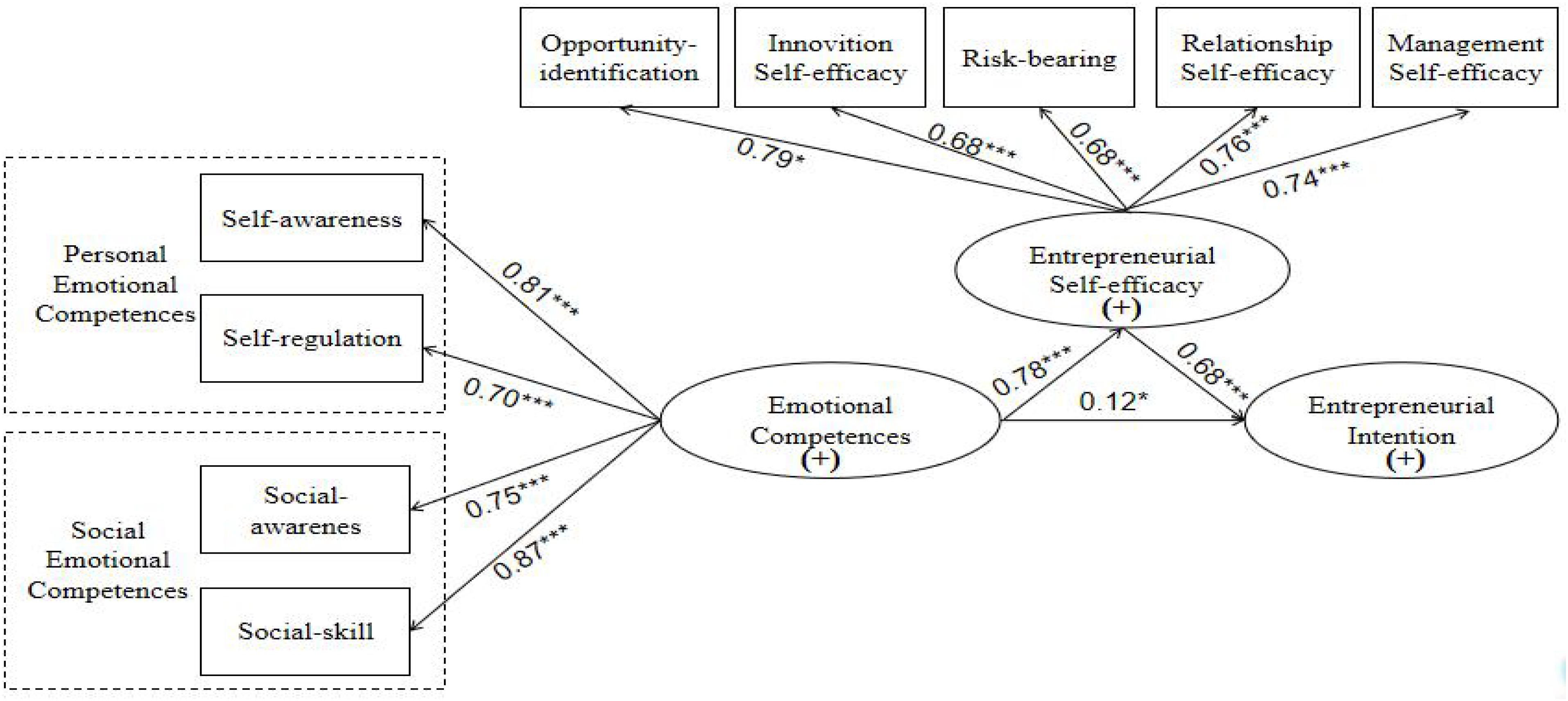
Figure 5. The integration model M4 of entrepreneurial self-efficacy as a mediator variable. *Significant at the level of P < 0.05; ***significant at the level of P < 0.001.
Further, we examined whether entrepreneurial self-efficacy mediated the aforementioned relationship fully or partially. As per the guidelines provided by Baron and Kenny (1986), if the path from emotional competence to entrepreneurial intention is not significant, then it can be concluded that entrepreneurial self-efficacy fully mediated the relationship. Otherwise, it can be concluded that it played a partial mediating role. As shown in Table 8, the direct effect of emotional competence on entrepreneurial self-efficacy was significant, but the indirect effect was not significant. The total effect of emotional competence on entrepreneurial intention was significant (t = 6.07). The direct effect was significant (t = 1.99), and the indirect effect was also significant. The corresponding t-value was 2.76 (i.e., substantially higher than 1.96). When entrepreneurial self-efficacy was included in the model, the significant positive relationship between emotional competence and entrepreneurial intention remained significant. Thus, Hypothesis 4 was supported. Entrepreneurial self-efficacy partially mediated the relationship between emotional competence and entrepreneurial intention.
Conclusion and Recommendations
Conclusion
Based on the present findings, several conclusions can be drawn. First, social–emotional competence had a positive effect on entrepreneurial intention, and the positive effect of personal affective competence on entrepreneurial intention was not supported or only partially supported. When their emotional competence improves, college students feel more confident about their entrepreneurial abilities. This helps them seize entrepreneurial opportunities. Second, all the dimensions of entrepreneurial self-efficacy were significantly and positively correlated with entrepreneurial intention. In other words, the higher their level of entrepreneurial self-efficacy was, the stronger their entrepreneurial intentions were. Third, the four dimensions of emotional competence (self-awareness, self-control, social awareness, and social skills) were positively related to the five dimensions of entrepreneurial self-efficacy (innovation effectiveness, opportunity recognition effectiveness, management effectiveness, risk tolerance effectiveness, and relationship effectiveness). Therefore, emotional competence has a significant positive impact on entrepreneurial self-efficacy. Fourth, entrepreneurial self-efficacy mediated the relationship between emotional competence and entrepreneurial intention. The present findings are consistent with the results of Salvador’s (2008) study in which emotional competence had a positive effect on the self-efficacy of entrepreneurs. Further, they enrich our understanding of the results reported by Tang and Zhang (2018) and Mwiya et al. (2018). They also delineate the relationship between emotional competence, self-efficacy, and entrepreneurial intention. In sum, emotional competence reinforced entrepreneurial intention by improving entrepreneurial self-efficacy. It is important to cultivate college students’ emotional abilities, including the management of personal and social–emotional abilities, and continuously provide guidance for future entrepreneurial endeavors. This is an important and effective means by which entrepreneurial intentions can be cultivated among college students (Baron and Kenny, 1986).
Recommendations
First, the development of emotional competence, especially the ability to overcome communication barriers, among college students should be emphasized. Entrepreneurship training programs should be provided to college students. The cultivation and application of emotional abilities will not only enhance their self-confidence and independence, help them build good interpersonal relationships, and respond to stress adaptively but also help them achieve resource integration at work or during entrepreneurial activities. Actively carrying out the activities about cultivating and applying college students’ emotional abilities in colleges, including adding related training in emotional use and management, stress response and management, interpersonal relationship coordination; providing scenario simulation, experience training, quality development, and social practice so as to improve the emotional competences of college students.
Second, drawing upon existing theories, college students should be differentiated based on their emotional competence and entrepreneurial self-efficacy levels. This will facilitate the exploration of a more comprehensive mechanism to promote innovation and nurture talent. Even though the emotional abilities of students are classified as abilities, entrepreneurial self-efficacy is a subjective assessment and belief (i.e., that one possesses the abilities needed for entrepreneurship) and is classified as a self-assessment of abilities. These two factors are closely related. Enhancing the emotional competence of college students will improve their entrepreneurial self-efficacy. Therefore, it is necessary and important to emphasize the cultivation and use of emotional abilities, underscore the role of entrepreneurial self-efficacy, actively establish personnel training measures, flexibly promote classroom diversity, nurture innovative thinking, and improve the practical abilities of students (Zeng et al., 2017).
The importance of strengthening the development of early-stage entrepreneurship practice platforms cannot be emphasized enough. This will foster collaboration between teachers and students and promote after-class practice. They serve as an important platform through which entrepreneurial intentions can be cultivated among college students. Equipped with good projects and ideas, college students will have to only take the first steps toward an entrepreneurial “long march.” Indeed, college students are afforded limited work experience. In general, when they explore business opportunities or entrepreneurial projects, they tend to remain in the theoretical analysis stage. When they are faced with problems and risks, college students tend to behave immaturely. As a result, their entrepreneurial ventures often result in failure. The development of an early entrepreneurial practice platform will ensure that students interact with their communities more closely, actively engage in practical activities, and translate their creative ideas into action. In this manner, they can explore and identify their strengths. Through collective effort, one can provide practical experience, management experience, business knowledge, resources, and assistance to cultivate thinking patterns for acquired entrepreneurship. This will help college students form more stable entrepreneurial intentions and lay the foundation for future entrepreneurial actions.
Data Availability Statement
The original contributions presented in the study are included in the article/supplementary material, further inquiries can be directed to the corresponding author.
Ethics Statement
Ethical review and approval was not required for the study on human participants in accordance with the local legislation and institutional requirements. Written informed consent to participate in this study was provided by the patient/participants’ or patient/participants legal guardian/next of kin.
Author Contributions
CC-C and MZ planned the study, collected the data, and wrote the manuscript. MZ, BS, and BL analyzed the data and wrote the manuscript. Three graduate students collected the data and wrote the manuscript. All authors listed have made a substantial, direct and intellectual contribution to the work, and approved it for publication.
Funding
This paper was supported by Guangdong Provincial Social Science Fund Project (GD16XYJ34), Guangdong Provincial Natural Science Foundation (2018A0303070008), Guangdong Provincial Natural Science Foundation Project (2018A030307040), Guangdong Province Philosophical and Social Science Planning Special Projects (GD20SQ25), Special Reinforcement Project and Discipline Construction of Foshan University (2019), High-level Talent Start-up Project Fund, the Innovation and Economic Transformation and Upgrading Research Center of the Guangdong Social Science Research Base, Guangdong Province Science and Technology Department Project “Industrial Ecosystem and Rural Revitalization”, and Guangdong Innovation and Entrepreneurship Education Curriculum: “Integrated Thinking Application and Practice”.
Conflict of Interest
The authors declare that the research was conducted in the absence of any commercial or financial relationships that could be construed as a potential conflict of interest.
Acknowledgments
The authors wish to thank the reviewers for their helpful comments on earlier drafts of this manuscript.
References
Ajzen, I. (1991). The theory of planned behavior. Organ. Behav. Hum. Decis. Process. 50, 179–211. doi: 10.1016/0749-5978(91)90020-t
Altinay, L., Madanoglu, M., Daniele, R., and Lashley, C. (2012). The influence of family tradition and psychological traits on entrepreneurial intention. Int. J. Hosp. Manag. 31:499. doi: 10.1016/j.ijhm.2011.07.007
Bandura, A., and Cervone, D. (1986). Differential engagement in self-reactiveinfluences in cognitively-based motivation. Organ. Behav. Hum. Decis. Process. 88, 92–113. doi: 10.1016/0749-5978(86)90028-2
Baron, R. M., and Kenny, D. A. (1986). The moderator-mediator variable distinction in social psychological research: conceptual, strategic and statistical considerations. J. Pers. Soc. Psychol. 51, 1173–1182. doi: 10.1037/0022-3514.51.6.1173
Bonesso, S., Gerli, F., Pizzi, C., and Cortellazzo, L. (2018). Students’ entrepreneurial intentions: the role of prior learning experiences and emotional, social, and cognitive competencies. J. Small Bus. Manag. 1:jsbm.12399. doi: 10.1111/jsbm.12399
Butter, E. H. (2001). Examining female entrepreneurs’ management style: an application of a relational frame. J. Bus. Ethics 29, 253–270.
Chen, Y., Jia, W. S., and Zheng, Y. J. (2018). Rational reflection and mode construction:innovation and entrepreneurship education of higher vocational colleges. Res. High. Educ. Eng. 2, 170–175.
Cui, J., and Sun, J. H. (2019). Research on the intermediary mechanism of college entrepreneurship education affecting college students’ entrepreneurial mind-based on the perspective of entrepreneurial emotion. High. Educ. Manag. 7, 108–115. doi: 10.12677/ASS.2019.85103
De Noble, A. F., Jung, D. I., and Ehrlich, S. B. (1999). Entrepreneurial Self-Efficacy: The Development of a Measure and its Relationship to Entrepreneurial Action. Waltham, MA: P&R Publication Inc.
Ding, M. L., and Ding, S. W. (2011). An Empirical study of college students’ entrepreneurial self-efficacy, behavior control perception and entrepreneurial intention. Stat. Inf. Forum. 3, 108–112. doi: 10.1108/17561391111144573
Ding, M. L., and Liu, B. X. (2009). Venture research: the theoretical origins and research directions from trait view to cognitive view. Mod. Manage. Sci. 8:124. doi: 10.1038/embor.2009.124
Fellnhofer, K. (2018). Narratives boost entrepreneurial attitudes: making an entrepreneurial career attractive? Eur. J. Educ. 4:274. doi: 10.1111/ejed.12274
Feola, R., Vesci, M., Botti, A., and Parente, R. (2017). The determinants of entrepreneurial intention of young researchers: combining the theory of planned behavior with the triple helix model. J. Small Bus. Manag. 57, 1424–1443. doi: 10.1111/jsbm.12361
Fernández-Pérez, V., Montes-Merion, A., Rodríguez-Ariza, L., and Alonso Galicia, P. E. (2019). Emotional competencies and cognitive antecedents in shaping student’s entrepreneurial intention: the moderating role of entrepreneurship education. Int. Entrepp. Manag J. 15, 281–305.
Fini, R., and Toschi, L. (2016). Academic logic and corporate entrepreneurial intentions: a study of the interaction between cognitive and institutional factors in new firms. Int. Small Bus. J. 76, 252–258. doi: 10.1177/0266242615575760
Hu, R., Wang, L., Zhang, W., and Bin, P. (2018). Creativity, proactive personality, and entrepreneurial intention: the role of entrepreneurial alertness. Front. Psychol. 9:951. doi: 10.3389/fpsyg.2018.00951
Kierstead, J. (1999). Human Resource Management Trends and Issues: Emotional Intelligence (EI) in the Workplace. Research Directorate, Policy Research and Communications Branch, Public Service Commission Branch, Public Service Commission of Canada. Available online at: http://www.psc-cfp.gc.ca/research/personnel/ei_e.htm (accessed October 2019).
Kirzner, I. M. (1997). Entrepreneurial discovery and the competitive market process: an austrian approach. J. Econ. Lit. 35, 60–85. doi: 10.2307/2729693
Krueger, N. F. (2000). The cognitive infrastructure of opportunity emergence. Entrep. Theory Pract. 24, 5–23. doi: 10.1177/104225870002400301
Krueger, N. F., and Brazeal, D. V. (1994). Entrepreneurial potential and potential entrepreneurs. Entrep. Theory Pract. 18, 91–104.
Krueger, N. F., Reilly, M. D., and Carsrud, A. L. (2000). Competing models of entrepreneurial intentions. J. Bus. Ventur. 15, 411–432.
Leutner, F., Ahmetoglu, G., and Akhtar, R. (2014). The relationship between the entrepreneurial personality and the Big Five personality traits. Pers. Individ. Differ. 63, 58–63. doi: 10.1016/j.paid.2014.01.042
Liu, J. W., Wu, J. L., and Gu, J. B. (2018). Entrepreneurial self-efficacy and opportunity recognition: the moderating effect of entrepreneurship education. Sci. Technol. Manage. Res. 38, 210–216. doi: 10.1145/335.35079
Liu, X. Y., Lin, C., Zhao, G., and Zhao, D. (2019). Research on the effects of entrepreneurial education and entrepreneurial self-efficacy on college students’ entrepreneurial intention. Front. Psychol. 10:869. doi: 10.3389/fpsyg.2019.00869
Lucas, W. A., and Cooper, S. Y. (2004). Enhancing self-efficacy to enable entrepreneurship: the case of CMI’s connections. Ssrn Electronic. 44, 489–604.
Martínez-González, J., Kobylinska, U., Garcia-Rodriguez, F. J., and Nazarko, L. (2019). Antecedents of entrepreneurial intention among young people: model and regional evidence. Sustainability 11:6993. doi: 10.3390/su11246993
Mayer, J. D., Caruso, D. R., and Salovey, P. (1999). Emotional intelligence meets traditional standards for an intelligence. Intelligence 27, 267–298.
Mikolajczak, M., Roy, E., and Luminet, O. (2007). The moderating impact of emotional intelligence on free cortisol responses to stress. Psychoneuroendocrinology 32, 1000–1012.
Mwiya, B. M. K., Wang, Y., Kayekesi, M., and Bernadette, K. (2018). Exploring entrepreneurial intention’s mediating role in the relationship between self-efficacy and nascent behaviour: evidence from Zambia, Africa. J. Small Bus. Enterp Dev. 3:83. doi: 10.1108/JSBED-03-2017-0083
Mycos Institute (2019). Chinese 4-Year College Graduates, Employment Annual Report. Social Sciences. Cambridge, MA: Academic Press.
Nowiński, W., Haddoud, M. Y., Lančarič, D., Egerova, D., and Czegledi, C. (2017). The impact of entrepreneurship education, entrepreneurial self-efficacy and gender on entrepreneurial intentions of university students in the Visegrad countries. Stud. High. Educ. 8, 1–19.
O’Boyle, E. H., Humphrey, R. H., Pollack, J. M., Hawver, T. H., and Story, P. A. (2011). The relation between emotional intelligence and job performance: a meta-analysis. J. Organ. Behav. 32, 788–818. doi: 10.1002/job.714
Padilla-Melendez, A., Fernandez-Games, M., and Molina-Gomez, J. (2014). Feeling the risk: effects of the development of emotional competences with outdoor training on the entrepreneurial intent of university students. Int. Entrep. Manag. J. 10, 861–884. doi: 10.1007/s11365-014-0310-y
Palmer, C., Fasbender, U., Kraus, S., and Bikner, S. (2019). A chip off the old block? - The role of dominance and parental entrepreneurship for entrepreneurial intentions. Rev. Manag. Sci. 5:e0342-17. doi: 10.1007/s11846-019-00342-17
Panagiotis, P., and Dimo, D. (2015). Burst bubbles or build steam? entrepreneurship education, entrepreneurial self-efficacy, and entrepreneurial intentions. J. Small Bus. Manag. 53, 970–985. doi: 10.1111/jsbm.12116
Popescu, C. C., Bostan, L., Robu, L.-B., and Maxim, A. (2016). An analysis of the determinants of entrepreneurial intentions among students: a Romanian case study. Sustainability 8, 771–793. doi: 10.3390/su8080771
Roy, R., and Das, N. (2019). A critical comparison of factors affecting science and technology students’ entrepreneurial intention: a tale of two genders. Int. J. Educ. Vocat. Guid 20, 49–77.
Salami, S. O. (2019). Examining the emerging entrepreneurial mindset in adolescence: a study in Nigeria. Int. J. Psychol. 2:431. doi: 10.1002/ijop.12431
Salvador, W. R. (2008). The entrepreneurial self-efficacy of nascent entrepreneur: the case of two economics in transition. J. Enterp. Cult. 10, 109–110. doi: 10.1142/S0218495802000165
Saulo, D. B., Megan, W., and Gerhardt, J. R. K. (2007). The role of cognitive style and risk preference on entrepreneurial self-efficacy and entrepreneurial intentions. Leadersh. Organ. Stud. 13, 63–77.
Schwarzer, R. (1997). The assessment of optimistic self-beliefs: comparison of the German, Spanish, and Chinese version of the general self-efficacy scale. Appl. Psychol. 46, 69–88. doi: 10.1111/j.1464-0597.1997.tb01096.x
Tang, Y. Z., and Zhang, Y. X. (2018). Research on the impact of college students’ creative personality on entrepreneurial willingness–mediating effect based on entrepreneurial self-efficacy. High. Edu. Explore 4:791.
Teixeira, A. A. C., and Forte, R. P. (2017). Prior education and entrepreneurial intentions: the differential impact of a wide range of fields of study. Rev. Manag. Sci. 11, 1–42. doi: 10.1007/s11846-015-0188-2
Tu, Y., and Wang, H. (2017). A study on the influence of college students’ self-efficacy and creativity on entrepreneurial intention. J. High. Educ. 3, 95–100.
Wang, Z. H. (2018). A Study on the transmission mechanism of the effect of college entrepreneurship education on college students’ entrepreneurial intention. Technol. Econ. 8, 76–80. doi: 10.1177/2515127419860307
Wood, R., and Bandura, A. (1989). Social cognitive theory of organizational management. Acad. Manag. Rev. 14, 361–384. doi: 10.2307/258173
Wu, Y. J., Liu, W. J., and Yuan, C. H. (2020). A mobile-based barrier-free service transportation platform for people with disabilities. Comput. Hum. Behav. 107:105776. doi: 10.1016/j.chb.2018.11.005
Wu, Y. J., Yuan, C. H., and Pan, C. I. (2018). Entrepreneurship education: an experimental study with information and communication technology. Sustainability 10:691.
Xu, H., and Hao, L. (2019). Research on the impact of entrepreneurship education on entrepreneurship willingness of college students–multiple intermediary effects based on entrepreneurial self-efficacy. Sci. Technol. Ind. 8, 103–108.
Xu, X., Ni, H., and Ye, Y. (2016). Factors influencing entrepreneurial intentions of Chinese secondary school students: an empirical study. Asia Pac. Educ. Rev. 17, 1–11. doi: 10.1007/s12564-016-9439-4
Yuan, C. H., and Wu, Y. J. (2020). Mobile instant messaging or face-to-face? Group interactions in cooperative simulations. Comput. Hum. Behav. 113:106508. doi: 10.1016/j.chb.2020.106508
Yuan, C. H., Wu, Y. J., and Tsai, K. M. (2019). Supply chain innovation in scientific research collaboration. Sustainability 11:753. doi: 10.3390/su11030753
Zampetakis, L. A., and Moustakis, V. (2006). Linking creativity with entrepreneurial intentions: a structural approach. Int. Entrep. Manag. J. 2, 413–428.
Zeng, F. Q., Qian, L., and Cui, X. R. (2017). Can emotional competences affect the entrepreneurial intent of social entrepreneurs?——the empirical study on Enactus in China. Innovation 11, 20–27. doi: 10.1371/journal.pone.0090051
Keywords: college students, college social entrepreneurs, entrepreneurial intention, emotional competences, entrepreneurial self-efficacy
Citation: Chien-Chi C, Sun B, Yang H, Zheng M and Li B (2020) Emotional Competence, Entrepreneurial Self-Efficacy, and Entrepreneurial Intention: A Study Based on China College Students’ Social Entrepreneurship Project. Front. Psychol. 11:547627. doi: 10.3389/fpsyg.2020.547627
Received: 31 March 2020; Accepted: 30 September 2020;
Published: 17 November 2020.
Edited by:
Chih-Hung Yuan, University of Electronic Science and Technology of China, Zhongshan Institute, ChinaCopyright © 2020 Chien-Chi, Sun, Yang, Zheng and Li. This is an open-access article distributed under the terms of the Creative Commons Attribution License (CC BY). The use, distribution or reproduction in other forums is permitted, provided the original author(s) and the copyright owner(s) are credited and that the original publication in this journal is cited, in accordance with accepted academic practice. No use, distribution or reproduction is permitted which does not comply with these terms.
*Correspondence: Muqiang Zheng, bXF6aGVuZ0BzdHUuZWR1LmNu
 Chu Chien-Chi
Chu Chien-Chi Bin Sun
Bin Sun Huanlian Yang
Huanlian Yang Muqiang Zheng2*
Muqiang Zheng2* Beibei Li
Beibei Li